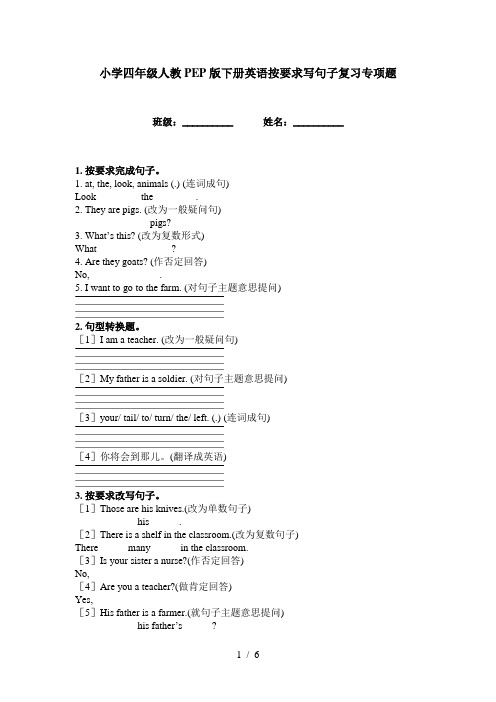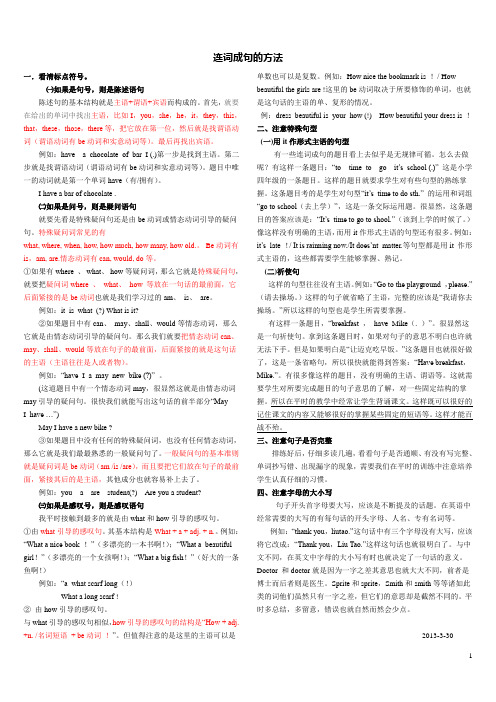小学英语四年级下册连词成句.
小学英语连词成句的方法

小学英语连词成句的方法连词成句的方法一、看清标点符号。
如果是句号,则是陈述语句。
陈述句的基本结构是主语+谓语+宾语。
首先,要在给出的单词中找出主语,如I、you、she、he、it、they、this、that、these、those、there等,把它放在第一位。
然后找谓语动词(包括be动词和实意动词等)。
最后找出宾语。
例如:I have a bar of chocolate.如果是问号,则是疑问语句。
要先看是特殊疑问句还是由be动词或情态动词引导的疑问句。
特殊疑问词常见的有what、where、when、how、how much、how many、how old。
Be动词有is、am、are。
情态动词有can、would、do等。
①如果有where、what、how等疑问词,那么它就是特殊疑问句。
要把疑问词放在句子的最前面,紧接的是be动词,如am、is、are。
例如:What is it?②如果题目中有can、may、shall、would等情态动词,那么它就是由情态动词引导的疑问句。
把情态动词放在句子的最前面,后面紧接的是这句话的主语(主语往往是人或物)。
例如:May I have a new bike?③如果题目中没有任何特殊疑问词,也没有任何情态动词,那么它就是一般疑问句。
一般疑问句的基本准则是疑问词是be动词(am/is/are),要把它们放在句子的最前面,紧接其后的是主语,其他成分也就容易补上去了。
例如:Are you a student?感叹语句通常以感叹号结尾,而我平时最常接触到的是由what和XXX引导的感叹句。
其中,由what引导的感叹句的基本结构是“What + a + adj。
+ n.”。
例如:“What a nice book!”(多漂亮的一本书啊!);“What a beautiful girl!”(多漂亮的一个女孩啊!);“What a big fish!”(好大的一条鱼啊!)。
连词成句的技巧(小学英语)

第三步:找到人称代词或是名词,把这些词放在助动词后
(1)人称代词
人称代词
人称
主格
第一人称 我
I
第二人称 你
you
单
数
他
he
第三人称 她
she
它
it
第一人称 我们
复 数 第二人称 你们
他她 第三人称 它们
we you they
宾格 me you him her it us you them
疑问词 what
What time What colour What about
What day What date
when
where which
意义 什么 什么时间 什么颜色 怎么样 星期几 什么日期 什么时候 哪里 哪一个
用法
例句
1.
What’s your name?
你叫什么名字?
用来问是什么,叫什 2.
(3) 数词+名词 1-亿
1 one, 2 two, 3 three, 4 four, 5 five, 6 six, 7 seven, 8 eight, 9 nine, 10 ten,
three book eight boys two classmate ten birds four doors
第四步:动词—— 表示人或事物的行为和状态的词 say look live study, work ,teach, stay, read, play, talk, rain go, come, start, begin, leave, arrive, reach, get , get up, join, marry, open, close, lend, borrow, finish, see, hear, die
小学四年级人教PEP版下册英语按要求写句子复习专项题

小学四年级人教PEP版下册英语按要求写句子复习专项题班级:__________ 姓名:__________1. 按要求完成句子。
1. at, the, look, animals (.) (连词成句)Look ________ the ________.2. They are pigs. (改为一般疑问句)_______ _______ pigs?3. What’s this? (改为复数形式)What _______ _______?4. Are they goats? (作否定回答)No, _______ ______.5. I want to go to the farm. (对句子主题意思提问)2. 句型转换题。
[1]I am a teacher. (改为一般疑问句)[2]My father is a soldier. (对句子主题意思提问)[3]your/ tail/ to/ turn/ the/ left. (.) (连词成句)[4]你将会到那儿。
(翻译成英语)3. 按要求改写句子。
[1]Those are his knives.(改为单数句子)______ ______his______.[2]There is a shelf in the classroom.(改为复数句子)There______many______in the classroom.[3]Is your sister a nurse?(作否定回答)No,______ ______[4]Are you a teacher?(做肯定回答)Yes,______ ______[5]His father is a farmer.(就句子主题意思提问)______ ______his father’s______?4. 把下列句子变成否定句。
1. Fruit is good for our health.2. I want to buy candy.3. I like potatoes.4. You can see a film in the cinema.5. Please use the shopping bag.5. 按要求完成下列句子。
(20130409)小学英语连词成句的方法

连词成句的方法一.看清标点符号。
㈠如果是句号,则是陈述语句陈述句的基本结构就是主语+谓语+宾语而构成的。
首先,就要在给出的单词中找出主语,比如I,you,she,he,it,they,this,that,these,those,there等,把它放在第一位,然后就是找谓语动词(谓语动词有be动词和实意动词等)。
最后再找出宾语。
例如:have a chocolate of bar I (.)第一步是找到主语。
第二步就是找谓语动词(谓语动词有be动词和实意动词等)。
题目中唯一的动词就是第一个单词have(有/拥有)。
I have a bar of chocolate .㈡如果是问号,则是疑问语句就要先看是特殊疑问句还是由be动词或情态动词引导的疑问句。
特殊疑问词常见的有what, where, when, how, how much, how many, how old.。
Be动词有is,am, are.情态动词有can, would, do等。
①如果有where 、what、how等疑问词,那么它就是特殊疑问句,就要把疑问词where 、what、how 等放在一句话的最前面,它后面紧接的是be动词也就是我们学习过的am、is、are。
例如:it is what (?) What is it?②如果题目中有can、may、shall、would等情态动词,那么它就是由情态动词引导的疑问句。
那么我们就要把情态动词can、may、shall、would等放在句子的最前面,后面紧接的就是这句话的主语(主语往往是人或者物)。
例如:“have I a may new bike (?)” 。
(这道题目中有一个情态动词may,很显然这就是由情态动词may引导的疑问句。
很快我们就能写出这句话的前半部分“MayI have …”)May I have a new bike ?③如果题目中没有任何的特殊疑问词,也没有任何情态动词,那么它就是我们最最熟悉的一般疑问句了。
小学英语四年级下册期末考试专练12-连词成句50题 全国通用译林版(三起)(含答案)

姓名:班级:学号:期末易错真题汇编小学英语四年级下册期末考试专练12-连词成句50题全国通用译林版(三起)(含答案)1.can’t, come, school, I, to, today (.)___________________________________ 2.tennis, play, and, table, go, let’s (.)___________________________________ 3.him, matter, what’s, with, the (?)___________________________________ 4.to, to, now, want, school, go, I (.)___________________________________ 5.can, what, you, see, over there (?)___________________________________ 6.can’t, come, to, school, I (.)___________________________________ 7.have, and, pie, a, come (.)___________________________________ 8.you, nice, a, do, have, dress, (?)___________________________________ 9.coat, this, my, is, (.)___________________________________ 10.flowers, you, under, can, see, any, the, tree (?) ___________________________________ 11.have, at, I, dinner, 6:30, usually, (.)___________________________________ 12.jacket, here, your, is, (.)___________________________________ 13.gloves, whose, these, are, (?)___________________________________ 14.Sue, may, speak, I, to (?)___________________________________ 15.autumn, in, climbing, we, go (.)___________________________________ 16.can, What, see, over, you, there (?)___________________________________17.watch, I, seven, usually, TV, at (.)___________________________________18.can , there, you, over, see, what (.)___________________________________19.you ,see, can ,a lot of, trees, flowers, and(?)___________________________________ 20.usually, dinner, at, in, six, the, fifteen, I, have, evening (.) ___________________________________21.don’t, lessons, we, Saturday, any, have, on(.)___________________________________22.do, have, what, afternoon, you, lessons, this (?)___________________________________23.come, can, to, I, see, class, after, you (?)___________________________________24.go, home, every, I, in, the, at, five, afternoon, day (.)___________________________________25.go, make, and, snowmen, we, skating (.)___________________________________26.fever, have, you, and, a, cough, a (.)___________________________________27.eat, in, ice creams, we, summer, can (?)___________________________________ 28.lessons, we, what, this, do, have, morning (?)___________________________________29.the, lunch, box, in, the, is, fox, not, for, the, hot dog (.) ___________________________________30.play, here, after, I, football, school(.)___________________________________31.there, the, like, you, over, do, tree (?)___________________________________ 32.football, afternoon, on, match, we, Sunday, a, have (.)___________________________________33.at, up, thirty, morning, get, the, I, six, in (.)___________________________________ 34.see, and, some, they, monkeys, hill, can, a (.) ___________________________________ 35.do, go, you, school, day, when, to, every, (?) ___________________________________ 36.can, the, on, lake, see, boat, you, the (?)___________________________________ 37.boat, I, lake, see, a, on, can, the (.)___________________________________ 38.footballs, how, have, many, do, you (?)___________________________________ 39.any, today, I, don’t, lessons, have, (.)___________________________________ 40.back, to, welcome, school, (.)___________________________________ 41.Yang Ling, is, speaking, this (.)___________________________________ 42.is, your, the, what, brother, with, matter(?) ___________________________________ 43.yellow, for, this, the, is, my, party, dress (.) ___________________________________ 44.you, see, on, can, river, the, a, boat (.)___________________________________ 45.can, come, school, you, to, tomorrow (?)___________________________________ 46.can, school, come, tomorrow, she, to (.)___________________________________ 47.is, warm, it, in spring (.)___________________________________ 48.can, what, you, over there, see (?)___________________________________ 49.a, big, cake, what (!)___________________________________50.sorry, I’m, that, hear, to (.)___________________________________参考答案:1.I can’t come to school today.【详解】本题考查句子结构。
小学英语连词成句

2.连成陈述句:
公式:代词/名词+动词+其他 1.four,seasons,there,in,year,are,a(.)
本内容仅供参考,如需使用,请根据自己实际情况更改后使用!
放映结束 感谢各位批评指导!
谢 谢!
让我们共同进步
连词成句的解Biblioteka 技巧Kerry 任第一步:看标点符号。
第二步:确定句型(问句、陈述句)
1.连成问句:
①特殊疑问句:找出疑问词:what , where , when , who , why , whose, how , how much/many...等放在句首。
②一般疑问句:如果没有疑问词,则找出助 动词:Be (动词)am/is/are , can , do , does ,did...等放在句首。
连成一般疑问句
do,does,have,be,can 公式:助动词+代词/名词+动词+其他成分?
1.their,is,school,big(?)
2.there,any,books,are(?)
连成特殊疑问句 公式:疑问词+一般疑问句? 1.favourite,what,is,day,your(?) 2.you,have,where,do,lunch(?)
哪一个是一般疑问句,哪一个是特殊疑问句
1.favourite,what,is,day,your(?) 2.there,any,books,are(?) 3.are,how,there,desks,many(?) 4.their,is,school,big(?) 5.pet,got,have,you,a(?)
(20130409)小学英语连词成句的方法
连词成句的方法一.看清标点符号。
㈠如果是句号,则是陈述语句陈述句的基本结构就是主语+谓语+宾语而构成的。
首先,就要在给出的单词中找出主语,比如I,you,she,he,it,they,this,that,these,those,there等,把它放在第一位,然后就是找谓语动词(谓语动词有be动词和实意动词等)。
最后再找出宾语。
例如:have a chocolate of bar I (.)第一步是找到主语。
第二步就是找谓语动词(谓语动词有be动词和实意动词等)。
题目中唯一的动词就是第一个单词have(有/拥有)。
I have a bar of chocolate .㈡如果是问号,则是疑问语句就要先看是特殊疑问句还是由be动词或情态动词引导的疑问句。
特殊疑问词常见的有what, where, when, how, how much, how many, how old.。
Be动词有is,am, are.情态动词有can, would, do等。
①如果有where 、what、how等疑问词,那么它就是特殊疑问句,就要把疑问词where 、what、how 等放在一句话的最前面,它后面紧接的是be动词也就是我们学习过的am、is、are。
例如:it is what (?) What is it?②如果题目中有can、may、shall、would等情态动词,那么它就是由情态动词引导的疑问句。
那么我们就要把情态动词can、may、shall、would等放在句子的最前面,后面紧接的就是这句话的主语(主语往往是人或者物)。
例如:“have I a may new bike (?)” 。
(这道题目中有一个情态动词may,很显然这就是由情态动词may引导的疑问句。
很快我们就能写出这句话的前半部分“MayI have …”)May I have a new bike ?③如果题目中没有任何的特殊疑问词,也没有任何情态动词,那么它就是我们最最熟悉的一般疑问句了。
小学英语连词成句的方法完整版
小学英语连词成句的方法HEN system office room 【HEN16H-HENS2AHENS8Q8-HENH1688】连词成句的方法一、看清标点符号。
二、㈠如果是句号,则是陈述语句。
陈述句的基本结构就是主语+谓语+宾语而构成的。
首先,就要在给出的单词中找出主语,比如I,you,she,he,it,they,this,that,these,those,there等,把它放在第一位,然后就是找谓语动词(谓语动词有be动词和实意动词等)。
最后再找出宾语。
例如:have achocolateofbarI (.)第一步是找到主语。
第二步就是找谓语动词(谓语动词有be动词和实意动词等)。
题目中唯一的动词就是第一个单词have(有/拥有)。
I have a bar of chocolate .㈡如果是问号,则是疑问语句。
就要先看是特殊疑问句还是由be动词或情态动词引导的疑问句。
特殊疑问词常见的有what,where,when,how,howmuch,howmany,howold.。
Be动词有is,am,are.情态动词有can,would,do等。
①如果有where 、 what、 how等疑问词,那么它就是特殊疑问句,就要把疑问词where 、 what、 how 等放在一句话的最前面,它后面紧接的是be动词也就是我们学习过的am、 is、are。
例如:itiswhat()What is it?②如果题目中有can、 may、shall、would等情态动词,那么它就是由情态动词引导的疑问句。
那么我们就要把情态动词can、may、shall、would等放在句子的最前面,后面紧接的就是这句话的主语(主语往往是人或者物)。
例如:“haveIamaynewbike ()” 。
(这道题目中有一个情态动词may,很显然这就是由情态动词may引导的疑问句。
很快我们就能写出这句话的前半部分“May I?have …”)May I have a new bike③如果题目中没有任何的特殊疑问词,也没有任何情态动词,那么它就是我们最最熟悉的一般疑问句了。
四年级下册英语期末复习(连词成句)∣人教(PEP)(含答案)
【点评】先把每个单词的意思翻译出来,再用它们的中文连成中文句子,最后根据
whose 引
导的特殊疑问句结构把中文句子翻译出来就是所要的答案。
ห้องสมุดไป่ตู้
4.【答案】 These sunglasses are too small.
【考点】连词成句
【解析】 【分析】句意是这副眼镜太小了。根据句意可知,要使用 These sunglasses这副眼镜
【点评】考查连词成句。
6.【答案】 Whose coat is this?
【考点】疑问句
【解析】【分析】 this 这个 , Whose 谁的 , is 是 , coat 外套 . 答案句意是 “这个是谁的外套? ”。
答案是一个由特殊疑问词 whose 引导的特殊疑问句,结构是 “whose 一+ 般疑问句? ”。
15.has,sheep, uncle, my, ten(.) ________ 16.is,garden,a,th is, vegetable(.) ________ 17.feel, sleepy,I( .) ________ 18.go to teachers' office Let's the ( . ) ________ 19.those,are,what(?) ________ 20.do,have, how,apples,many,you(?) ________ 21.is That playground the ( . ) ________ 22.sunny; Sydney;is;in;it( .) ________ 23.make;I ;can;snowman; a(?) ________ 24.is;today; cold;it( . ) ________ 25.to our Welcome school ( ! ) ________ 26.the first It's floor on ( . ) ________ 27.How students many are in room your there ( ? ) ________ 28.time, is, what, it (?) ________ 29.for, time, is, it, lunch (.) ________
小学英语连词成句技巧
小学英语连词成句技巧小学英语从四年级开始,出现了一种新的题型——连词成句,学生们总是做得有些欠缺,下面就说说我经过实践总结的几点小窍门;一、看清标点符号1.如果是句号,则是陈述语句。
陈述句的基本结构就是主语+谓语+宾语而构成的。
2.如果是问号,则是疑问语句。
①如果有where?、?what、?how等疑问词,就要把疑问词where?、?what、?how?等放在一句话的最前面,它后面紧接的是be动词也就是我们学习过的am、?is、?are三个单词。
②如果题目中有can、?may、would等情态动词,那么我们就要把may等放在句子的最前面,后面紧接的就是这句话的主语(主语往往是人或者物)③如果题目中没有任何的特殊疑问词,也没有任何情态动词,一般疑问句的基本准则就是疑问词是be动词(am /is/are),而且要把它们放在句子的最前面。
那么它就是我们最最熟悉的一般疑问句了。
二注意字母的大小写字母的大小写,应该是不断提及的话题。
在英语中经常需要的大写的有每句话的开头字母、人名、专有名词等。
三、注意句子是否完整往往学生在做完一条题目以后,经常会出现句子还没有写完整,单词抄写错的现象。
我在教学中经常会发现有许多学生(其中也包括学习不错的学生)在做这样的题目时出现漏字、错字的毛病。
这就需要我们在平时的训练中注意培养学生认真仔细的习惯。
在做题目时要不断地给同学们出“难题”,让他们出现错误,并能够在同学或者老师的帮助下发现错误,加深印像。
还可以通过帮助其他同学“找错误”等活动来帮助学生增强细心意识。
这样既发挥了学生的主观能动性又让学生得到了很好的锻炼。
还有一些连词成句的题目看上去似乎是无规律可循。
怎么去做呢?这些句型在平时的练习中要多掌握一些固定短语的使用比如:go to school, go shopping, put on?, take off 等等小学英语连词成句的技巧1、带有标点符号的。
有的连词成句每个小题的后面给出所要连成的句子的标点。
- 1、下载文档前请自行甄别文档内容的完整性,平台不提供额外的编辑、内容补充、找答案等附加服务。
- 2、"仅部分预览"的文档,不可在线预览部分如存在完整性等问题,可反馈申请退款(可完整预览的文档不适用该条件!)。
- 3、如文档侵犯您的权益,请联系客服反馈,我们会尽快为您处理(人工客服工作时间:9:00-18:30)。
连词成句(注意大写情况和标点符号) 4.putting,her,she,books,in,her,is,bag 5.are,there,pencils,five,on,desk,the
9.not,Kim ’
11.you,can,say,year,the,months,the,of 13.you,ready,for,are,class,English
15.let,us,say,the,days,week,.the,of
18.in,boy,the,third,is,shorts,the,red 19.t he,leaves,wind,is,tree ’s,blowing,the
21.cold,snow,is,and,white 22.I,play,snow,in,to,like,the
27.tomorrow,Tuesday,March,second,is
33.September,first,my,birthday,is 34.in,an,apartment,is,apartment,building,an 36.a,house,school,I,in,live,near
38.go,to,house,let ’s,your 39.address,Danny ’s,is,what 40.a,house,on,in,Ninth Avenue,live,I 41.ride,I,bicycle,school,to,my 42.is,a,bus,this,a,truck,or
43.to,walk,you,do,school
45.the,same,like,we,colour
47.is,your,what,food,favourite
48.have,we,supper,the,evening,in 49.like,I,a,for,sandwich,lunch
50.either,I,like,don ’t,fish 52.cookies,I,for,have,dessert 53.don ’t,like,they,icecream 55.draw,I,to,pictures,like 56.you,stories,like,to,write 57.are,we,a,new,song,singing
58.basketball,Jenney,to,likes,play 60.they,their,like,socks,pink
61.how,do,many,you,apples,have
62.you,walk,school,to,do
64.play,Jenny,to,likes,with,doll,her 67.Sunday,the,week,of,a,first,day,is
69.May,Wednesday,tomorrow,thirtieth,is 73.have,evening,I,in,the,supper,six,at,O ’clock
77.Wednesday,June,it ’ 78.the,today,weather,how ’
84.is,Wednesday,today,June,first 86.lives,my,grandfather,in,apartment,an
87.Peter ’s,is,colour,what,shirt
88.can,we,in,play,park,the
89.Is,your,when,birthday
90.go,to,by,school,bus,I
92.far,from,school.it ’ 93.address,104,Ninth,my,is,Av enue
94.are,two,these,skirts,blue
95.the,like,we,colour,same
96.are,favourite,donuts,my,dessert
97.too,like,I,and,sandwich,milk
98.lunch,favourite,what ’s,for,your,food
99.our,we,purple,like,shirts
100.their,they,orange,like,sweater
102.favourite,clothes,is,what,your
104.don ’ 106.colour,we,the,like,same
107.favourite,is,my,food,rice 110.my,school,favourite,that ’s,work
112.like,colour,we,same,the 115.is,colour,my,favourite,blue。
